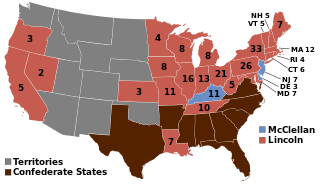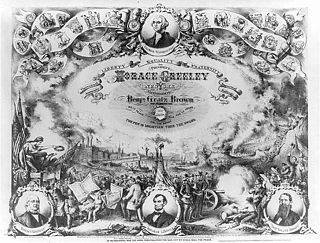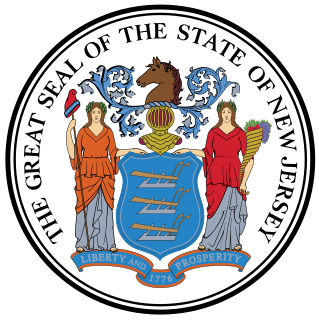Election for the governorship of the U.S. state of Ohio
| |||||||||||||||||
| |||||||||||||||||
| |||||||||||||||||
The 1865 Ohio gubernatorial election was held on October 10, 1865. National Union nominee Jacob Dolson Cox defeated Democratic nominee George W. Morgan with 53.53% of the vote.
| |||||||||||||||||
| |||||||||||||||||
| |||||||||||||||||
| Elections in Ohio |
|---|
 |
The 1865 Ohio gubernatorial election was held on October 10, 1865. National Union nominee Jacob Dolson Cox defeated Democratic nominee George W. Morgan with 53.53% of the vote.
| Party | Candidate | Votes | % | ±% | |
|---|---|---|---|---|---|
| National Union | Jacob Dolson Cox | 223,633 | 53.53% | ||
| Democratic | George W. Morgan | 193,797 | 46.39% | ||
| Majority | 29,836 | ||||
| Turnout | |||||
| National Union hold | Swing | ||||

The 1864 United States presidential election was the 20th quadrennial presidential election. It was held on Tuesday, November 8, 1864. Near the end of the American Civil War, incumbent President Abraham Lincoln of the National Union Party easily defeated the Democratic nominee, former General George B. McClellan, by a wide margin of 212–21 in the electoral college, with 55% of the popular vote. For the election, the Republican Party and some Democrats created the National Union Party, especially to attract War Democrats.

The 1888 United States presidential election was the 26th quadrennial presidential election, held on Tuesday, November 6, 1888. Republican nominee Benjamin Harrison, a former Senator from Indiana, defeated incumbent Democratic President Grover Cleveland of New York. It was the third of five U.S. presidential elections in which the winner did not win a plurality of the national popular vote, which would not occur again until the 2000 US presidential election.

Jacob Dolson Cox, Jr., was a statesman, lawyer, Union Army general during the American Civil War, Republican politician from Ohio, Liberal Republican Party founder, educator, author, and recognized microbiologist. He served as president of the University of Cincinnati, the 28th governor of Ohio and as United States Secretary of the Interior. As Governor of Ohio, Cox sided for a time with President Andrew Johnson's Reconstruction plan and was against African American suffrage in the South, though he supported it in Ohio. However, Cox increasingly expressed racist and segregationist viewpoints, advocating a separate colony for blacks to "work out their own salvation." Seeing himself caught between Johnson and the Radical Republicans, Cox decided not to run for reelection. He stayed out of politics for a year, though both Sherman and Grant advocated that Cox replace Stanton as Secretary of War as a means of stemming the demands for Johnson's impeachment. But Johnson declined. When Ulysses S. Grant became president, he nominated Cox Secretary of Interior, and Cox immediately accepted.

The Liberal Republican Party was an American political party that was organized in May 1872 to oppose the reelection of President Ulysses S. Grant and his Radical Republican supporters in the presidential election of 1872. The party emerged in Missouri under the leadership of Senator Carl Schurz and soon attracted other opponents of Grant; Liberal Republicans decried the scandals of the Grant administration and sought civil service reform. The party opposed Grant's Reconstruction policies, particularly the Enforcement Acts that destroyed the Ku Klux Klan. It lost in a landslide, and disappeared from the national stage after the 1872 election.
The Army of the Ohio was the name of two Union armies in the American Civil War. The first army became the Army of the Cumberland and the second army was created in 1863.

The 53rd United States Congress was a meeting of the legislative branch of the United States federal government, consisting of the United States Senate and the United States House of Representatives. It met in Washington, D.C. from March 4, 1893, to March 4, 1895, during the first two years of Grover Cleveland's second presidency. The apportionment of seats in the House of Representatives was based on the Eleventh Census of the United States in 1890.

During the American Civil War, the State of Ohio played a key role in providing troops, military officers, and supplies to the Union army. Due to its central location in the Northern United States and burgeoning population, Ohio was both politically and logistically important to the war effort. Despite the state's boasting a number of very powerful Republican politicians, it was divided politically. Portions of Southern Ohio followed the Peace Democrats and openly opposed President Abraham Lincoln's policies. Ohio played an important part in the Underground Railroad prior to the war, and remained a haven for escaped and runaway slaves during the war years.

The National Union Party was the temporary name used by the Republican Party and elements of other parties for the national ticket in the 1864 presidential election that was held during the Civil War. For the most part, state Republican parties did not change their name. The temporary name was used to attract War Democrats, border state voters, and Unconditional Unionist and Unionist Party members who might otherwise have not voted for the Republican Party. The party nominated incumbent Republican President Abraham Lincoln of Illinois with life-long Democrat Andrew Johnson of Tennessee for Vice President. They won the electoral college 212–21.

Alexander Long was a Democratic United States Congressman who served in Congress from March 4, 1863, to March 3, 1865. During the Civil War, Long was a prominent "Copperhead", a member of the peace movement of the Democratic Party, and he was identified as being one of the war's most vehement opponents. Even though Long was a "free-soiler" Democrat who in his early years voted to repeal the "Black Laws of Ohio", he later opposed both emancipation and suffrage for blacks.
The Massachusetts Republican Party (MassGOP) is the Massachusetts branch of the U.S. Republican Party.

George Washington Morgan was an American soldier, lawyer, politician, and diplomat. He fought in the Texas Revolution and the Mexican–American War, and was a general in the Union Army during the American Civil War. Morgan later served as a three-term postbellum United States Congressman from Ohio. He also served as the United States Ambassador to Portugal from 1858 to 1861, during the term of President James Buchanan.

George Washington Julian was a politician, lawyer, and writer from Indiana who served in the United States House of Representatives during the 19th century. A leading opponent of slavery, Julian was the Free Soil Party's candidate for vice president in the 1852 election and was a prominent Radical Republican during the American Civil War and the Reconstruction era.

Martin Welker was a United States representative from Ohio for three terms from 1865 to 1871 and a United States district judge of the United States District Court for the Northern District of Ohio from 1873 to 1889.
The 1868 and 1869 United States Senate elections were elections which had the Republican Party maintain their majority in the United States Senate. However, six former Confederate states were also readmitted separately from the regular election, each electing two Republicans. This increased the Republicans' already overwhelming majority to the largest proportion of seats ever controlled by the party.
Electoral history of John Sherman, Representative, United States Senator, and cabinet member.

The 1864 United States elections were held on November 8, 1864. National Union President Abraham Lincoln was elected to a second term, while the Republicans added to their majorities in Congress. The elections were held during the American Civil War. Lincoln would be assassinated shortly into his second term.

The 1895 New Jersey gubernatorial election was held on November 5, 1895. Republican nominee John W. Griggs defeated Democratic nominee Alexander T. McGill with 52.28% of the vote.

The 2022 Maryland gubernatorial election will take place on November 8, 2022. In this Maryland gubernatorial election will be elected the next governor of Maryland, among other officials. Governor Larry Hogan, the incumbent two-term Republican, is term-limited and cannot seek re-election to a third consecutive term.

The 1865 Connecticut gubernatorial election was held on April 3, 1865, the last such election held during the American Civil War, and the last gubernatorial election in which the Republicans adopted the National Union Party name. It was a rematch of the 1864 Connecticut gubernatorial election. Incumbent governor and National Union nominee William Alfred Buckingham defeated Democratic nominee Origen S. Seymour with 57.48% of the vote. It was the eighth and last of Buckingham's consecutive victories.